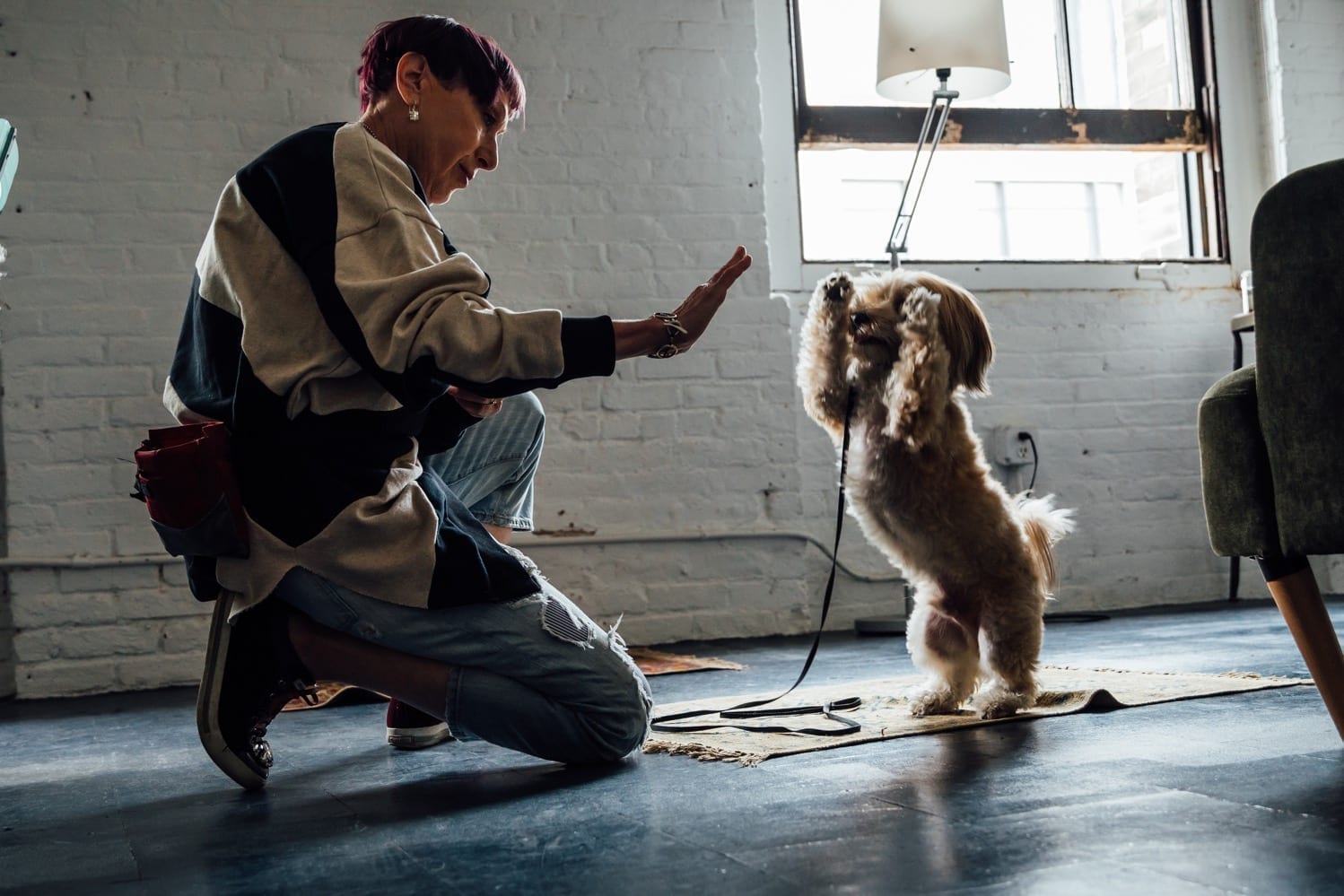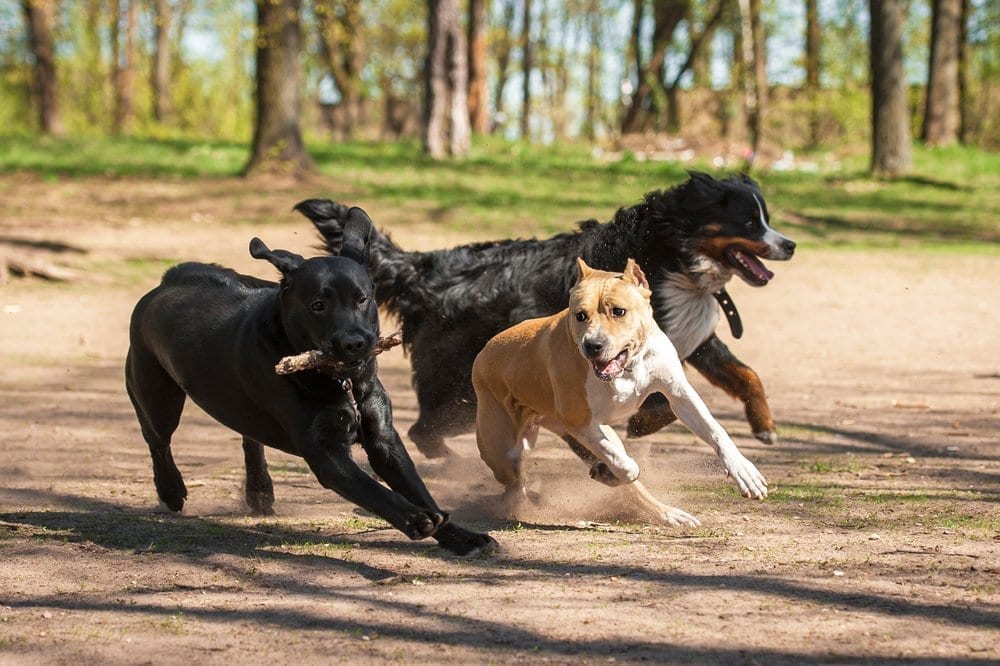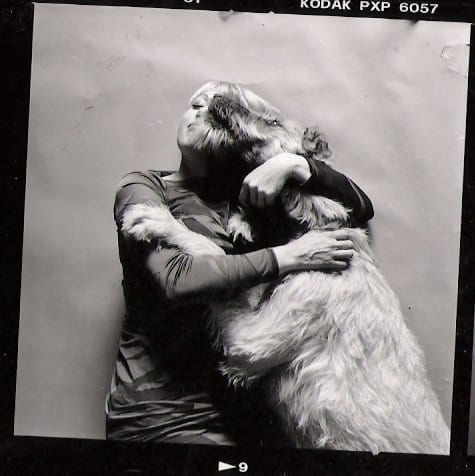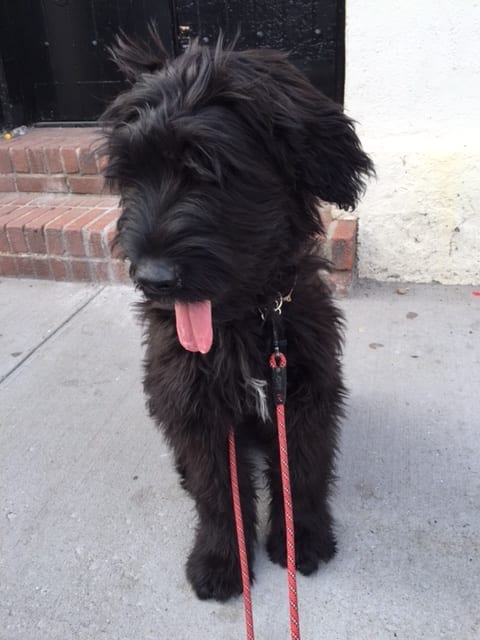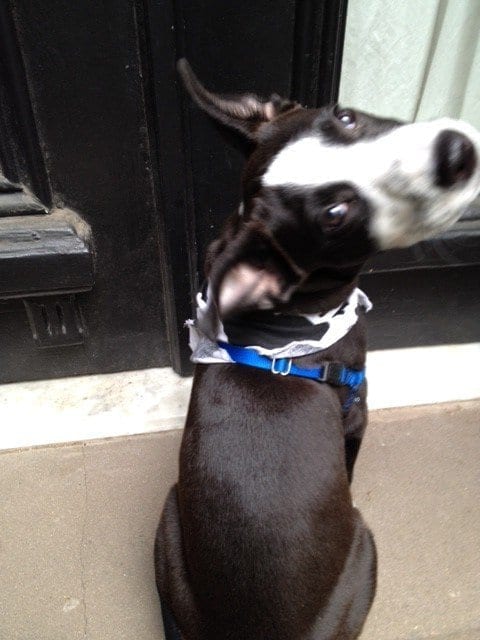http://nymag.com/daily/intelligencer/2014/07/elizabeth-weiss-dog-trainer-encounter.html
Making House Calls With Elisabeth Weiss, New York’s Most Musical Dog Trainer
By Jada Yuan

“Wow! Good girl!” Elisabeth Weiss chirps in a voice higher than Olive Oyl’s after inhaling helium. She’s talking to her first client of the day, an 11-year-old black-and-white Border collie named Oreo. They lock eyes, Weiss waves her hand, and Oreo springs up onto two air-filled stability balls—a shaky balancing act on all four paws. It’s a rehab exercise to strengthen the ACL and medial meniscus Oreo tore in her left hind leg last November. Another wave of Weiss’s hand and Oreo is back on the floor. “C’mon, cookie! C’mon, cooks! Let’s go!” Up and down, up and down Oreo climbs, struggling but determined, transfixed by Weiss’s spell of encouragement—and the nuggets of freeze-dried beef tripe she’s holding. “She knows she’s doing well!” says Weiss, whose talents bring her entrée into the homes of a certain set of New York’s moneyed canine owners. “She’s such a brave dog!”
Weiss uses her normal voice when speaking to humans, though a few minutes in her presence will make anyone start talking like a cartoon. Even Lou Reed, for whom she trained two dogs, would try to imitate her dog voice, “which was hilarious,” she says. Today’s first house call takes place in the living room of a Midtown West apartment, where Oreo’s psychiatrist owner, a divorcé, keeps his extensive Star Wars collection.
A slender blonde with purple streaks in her hair, Weiss wears a brown-and-black patterned bubble dress with bottomless pockets carrying lavender-scented poop bags. Underneath that, she’s got on a trainer’s trick for additional protection, pastel floral pants. Among her many necklaces is a brass pendant embossed with the outline of a bone in memory of Wittgy, a wire-haired dachshund she once loved and lost, named after the philosopher Wittgenstein.
A former professional violinist from Vienna, Weiss got into dog training accidentally, through owning dogs, including an Irish wolfhound named Salome (after the Strauss opera), whose size, beauty, and manners had made her a bit of a neighborhood celebrity along the walking paths of the West Village. She met Reed and his wife, Laurie Anderson, her first professional clients, through their downstairs neighbor in July 2010, when their beloved rat terrier, Lolabelle, was dying of pancreatic cancer. “She was just lying there,” says Weiss, “and I think everybody was depressed.”
Weiss believes dogs find music soothing and has trained her own briards, Cosi and Petzi, to play piano with their paws and noses. (This practice is based on the philosophy that teaching dogs to touch things builds self-confidence.) The hope was that if Lolabelle could learn to do the same in her moribund state, it might produce endorphins and give her “a passion of sorts,” says Weiss. The first day Weiss came over, she lured Lolabelle to one of the 20 or so keyboards Anderson had lying around the apartment, and the results were so thrilling Reed asked Weiss to come back every day. “I didn’t know who Lou Reed was,” she says. “I only care about the dog.”
Melodic precision is a little much to ask from dogs, but Lolabelle had great rhythm. Soon she’d learned to ring a bell and knock castanets, all while sitting at the keys. “She was a whole one-dog band,” says Weiss. Even when Lolabelle went blind and was placed on oxygen, Weiss says, “she would drag herself to the piano, and she would still want to play.” Lolabelle died around Easter 2011, having lasted more than a year longer than her prognosis. Reed and Anderson gave her a Buddhist funeral.
It was at Reed’s 70th birthday party, in 2012, that he started talking to Weiss about getting another dog. She found them Will, a Border terrier; Reed liked to refer to the dog as “my son.” When he and Anderson wanted to fly with the puppy onboard with them, Weiss had Will registered as Reed’s emotional-support animal.
It was through Reed and Anderson that Weiss wound up house-training Jann Wenner’s wheaten terrier, Max, for a few months. (She charges $350 for an initial consultation and $150 to $200 for sessions of about an hour.) Anderson also referred her to Vito Schnabel, whose bulldog Albert was afraid to go outside. (“I plastered 11th Street with roast beef for him,” says Weiss.) The last time she saw Reed, Julian Schnabel, who lived across the street, was visiting, and Reed scolded Schnabel about the out-of-control Rhodesian Ridgeback–bloodhound mix, Buddy, he’d just adopted from a shelter. “Lou said, ‘You’ve got to train it. That dog is dangerous.’ ” The next day Weiss went to Julian’s, and a couple of weeks later Reed died of liver disease. Weiss stood onstage at Reed’s Apollo Theater memorial with Will (“He went nuts when John Zorn started playing”). Now two years old, Will is a master of tricks. He can do “hot dog,” where he rolls himself in a blanket, and “Get me a cold one!,” where he fetches a drink from the fridge. He doesn’t play keyboard—music may forever belong to Lolabelle in the Anderson household—but Weiss is trying to teach him how to skateboard.
“Have you ever seen the Redford movie The Horse Whisperer? That’s Elisabeth,” says Myrna Gershon, whose Tibetan terrier, Buddy, is another client today. “She has the patience of Job; she has a biblical gift,” says Myrna’s husband, Freddie. They found Weiss through Myrna’s tai chi instructor, who’d also worked with Reed and had raved about what Weiss had done for Lolabelle and Will. (Almost all of Weiss’s clientele has come through word of mouth.) Freddie is co-owner of a licensing company that manages the rights to every Disney stage production and Stephen Sondheim musical, as well as Annie, Fiddler on the Roof, and Les Misérables; Myrna came up with the idea for Flintstones vitamins. Weiss goes over to their Upper East Side apartment every day to work with Buddy (a popular dog name among the one percent, apparently), who was so “ornery” when they first got him, according to Myrna, that Weiss had to move in for a week and put him through boot camp.
But it was hardly militaristic: Weiss has developed her own style of what’s known in the community as “positive reinforcement training,” which means she never uses “No!,” or what’s known as “compulsion training.” (“You don’t talk to somebody you like like that,” she says.) It worked on Buddy; he now has regular playdates with Sondheim’s standard poodles. He’s been doing keyboard for only a month but has the unique skill of being able to cross his paws. Soon, “he’ll be doing Liberace numbers!” Weiss says. “You think he can get a job at a piano bar?”
*This article appears in the July 28, 2014 issue of New York Magazine.
Related
First I have to say: I was fairly taken aback when I heard that New York Magazine wanted to do a piece on me, especially one that was rather prominently placed inside the print edition.
At the same time I was terribly excited and looking forward to the actual interview.
It was a such a great experience!
The process itself reminded me a little bit of traveling: Feeling pressured for time cause you are going to miss the plane and rushing like mad only to have to wait at the airport because the flight is delayed! But in the end the journey is oh so worthwhile!
Jada Yuan, http://observer.com/2011/08/media-power-bachlorettes/jadabird/ the author of the piece and I came up with a plan: Jada was going to trail me on a Thursday afternoon on my three regularly scheduled appointments and afterwards we’d go to visit a friend of hers in Brooklyn whose rescue terrier according to Jada had “issues”. I opted not to get any detailed information in advance so I would treat that meeting like a first consultation with a new client.
We met at Oreo’s place. I was a bit worried about Oreo’s ability to perform because the night before there had been a series of heavy thunderstorms and Oreo has terrible fear of those. I noticed as soon as I walked in that she was not quite her enthusiastic self. No wonder…her human had given her acepromazine to get through the storm without going completely nuts and I guess some of it was still in her system. Nevertheless, Oreo did not let me down!! She performed like a pro and even though she was not at her BEST, she was awesome. What a great effort she made for me.
Next we moved on to Isis and Bear. Isis jumped through my arms, did her very special personal tricks like “motor cycle” “lizard” and “roll over” she jumped through my arms and finally both Bear and Isis touched the balance pads and they both played the keyboards. Jada sat and observed from the staircase in the entry where we were working, sharing steps with Barack, the black and white cat who always comes and watches my lessons with Isis and Bear.
On we went to Buddy, who is featured in the photo of the article. Buddy was very happy to show off his repertoire and Myrna Gershon talked a bit with Jada.
Then came the most exciting part for me personally : going to Brooklyn to meet a new dog! and hearing the story of “Harvey” and his “issues”.
I showed Marie, Harvey’s human, how to teach Harvey impulse control, sit/wait for his food, sit for all desirable things (food, attention and toys) and how to teach Harvey to walk on a loose leash. Harvey was superb! He actually did everything I predicted he would do! He learned how to think for himself in that lesson. Most gratifying to me was that I learned from Jada a few days later that Marie had reported to her that Harvey was “ a changed dog”. That really is what I LOVE TO HEAR! That is why I love what I do! Making a difference in peoples’ and dogs’ lives! What could be better?
After some delays there was a really fun photo session with Bobby Doherty http://bobbydoherty.tumblr.com/ at the Gershon’s home with the beautiful Tiffany entrance screen as a background.
A few days after that Abe Riesman http://abrahamriesman.com/ came up with the video idea for the online edition. He filmed Isis’ tricks and Bear and Isis playing the piano ( the tricks never made it onto the final video because I guess the theme was “dogs playing piano”) not did Buddy’s performance of distance obedience with hand signal only, opening the trashcan, crossing his paws both ways or ringing the little service bell make the final cut. But his keyboard playing did! Buddy absolutely loves activities that allow him to manipulate things. Right now the keyboards capture his attention completely and for a very long time. This is followed by his second favorite activity: opening a little trashcan.
Once Rachel Milzoff actually called me to check all facts: I was pretty sure that IT WAS ACTUALLY GOING TO HAPPEN!
And there it is!
So cool! …and I don’t even hate my picture!
Thank you all who helped make this happen!






